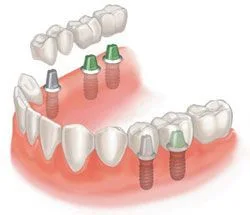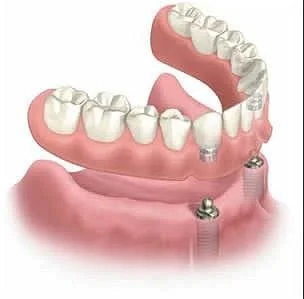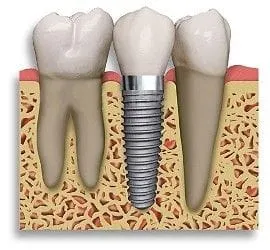IMPLANTS - A More Natural Approach to Tooth Replacement



Dental implants are designed to provide a foundation for replacement teeth that look, feel, and function like natural teeth. The person who has lost teeth regains the ability to eat virtually anything and can smile with confidence, knowing that their teeth appear natural and that their facial contours will be preserved. The implants themselves are small sturdy titanium threaded posts that are placed into the jawbone and act as the root structure where teeth are missing. Titanium metal is used because of its compatibility with bone and oral tissues. The bone bonds with the titanium, creating a strong foundation for artificial teeth. In addition, implants can help preserve facial structure. After the bone has grown around the implant, implants can hold crowns, bridges, over-dentures or partials just like roots hold natural teeth in place. Implants are very durable and can last a lifetime preventing the bone deterioration that occurs when teeth are missing.Dental implants are long lasting, never develop cavities or need root canals and most importantly they look and feel like your own natural teeth. They require the same maintenance as natural teeth; this includes brushing, flossing and regular dental check-ups.
FIVE GOOD REASONS TO REPLACE MISSING TEETH:
1. JAWBONE DETERIORATION - As soon as a tooth is lost the supporting bone in the jaw begins to dissolve. This process is called resorption. The longer teeth are missing, the greater the bone loss. Over time, resorption of the jawbone has a considerable effect on quality of life and on the possibility of replacing the missing teeth because of the lack of bone to support an implant or denture. Unfortunately dentures and partials unsupported by implants can actually increase the rate of jawbone shrinkage. The greatest advantage of titanium implants is that they will maintain the jawbone just like your natural teeth.
2. COSMETIC - Missing teeth are associated with old age and can make you look older than you are. After the loss of teeth, because the jawbone resorbs, the muscles of facial expression that attach to the jawbone can become weakened and sag which results in an older appearance. Replacing missing teeth can dramatically improve your smile and the shape of your face. This greatly enhances both your dental health and self-esteem.
3. FUNCTION - As teeth are lost it becomes more difficult to eat and chew food. Studies have shown that one out of three denture wearers eat only soft or mashed foods and 50 percent avoid many of the foods they enjoy all together. Chewing force on a denture not supported by implants can be only 5-20 percent of the chewing force you enjoyed with your natural teeth. Over time, as more of the jaw bone shrinks the selection of food becomes not necessarily what you want, but what you are able to eat with limited chewing force.
4. HEALTH - As teeth are lost the adjacent teeth eventually tip and drift, and opposing teeth extrude into these spaces resulting in malalignment of remaining teeth. Food and plaque are trapped in these hard to clean spaces causing cavities and gum disease. Because of difficulity in chewing, many foods that contribuite to your overall health are neglected.
5. COMFORT AND CONFIDENCE - As most denture wearers know, conventional dentures are not attached to the jawbone and can be unstable, lacking desired retention. Many times this results in sore spots, embarrassment when eating in public and lack of confidence when speaking and smiling. For many years conventional dentures and partials were the best dentistry had to offer.
In summary, implants have a great record of success, however with any dental procedure there are no guarantees and there are risks inherent in any surgical procedure. After an extraction, or if excessive bone loss has occurred at the site planned for an implant , bone grafts may be needed prior to implant placement. A good guideline is that 40 to 60 percent of the bone that surrounds the tooth root is usually lost within 2 to 3 years of tooth extraction if no implant is placed. Please feel free to ask questions if you feel that this exciting area of dentistry could benefit you.